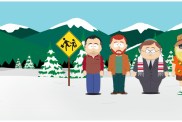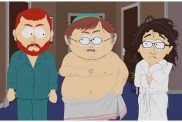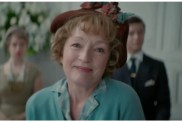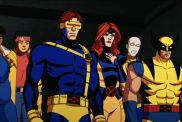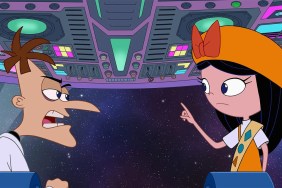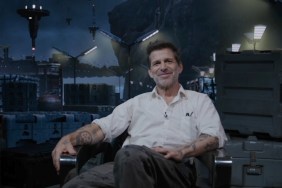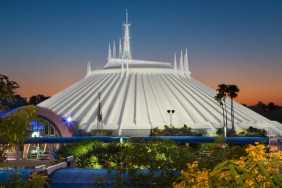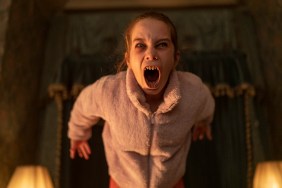
I’m quite certain you could lop off the first 20-30 minutes of Tomorrowland and never notice. Then again, the same could probably be said for the final 80-90 minutes. There is little to no point to this movie other than to throw a plastic-wrapped vision of imagination and invention alongside a ham-fisted environmental message down our throats with all the subtlety of James Cameron’s Avatar, but Cameron had the good sense to at least develop a story around his preaching whereas Tomorrowland beats around the bush until finally allowing Hugh Laurie to belt out his sermon before delivering the film’s ultimate finale with a big dull thud.
Director Brad Bird (Mission: Impossible – Ghost Protocol, Ratatouille), who co-wrote the film’s screenplay with Damon Lindelof (“Lost”, Prometheus), spends nearly a quarter of the film’s running time introducing us to the young inventor Frank Walker (Thomas Robinson). Frank has built a jetpack and is attending the 1964 World’s Fair with the intention of winning a $5 prize. His entry is rebuffed by one of the judges (Laurie) when a precocious, young girl, Athena (Raffey Cassidy), takes a shine to the young man, gives him a mysterious pin and he suddenly finds himself transported off to the world of Tomorrowland, a typically sanitized, futuristic utopia filled with phallic skyscrapers, flying cars and some strange series of pools people are diving through. What happens here? Well, nothing, because now we’re whisked off to the present day… where the film actually should have begun.
After wasting our time on a plot point that could have been limited to a sentence later in the film we’re finally introduced to Casey Newton (Britt Robertson), the film’s true protagonist, as she is attempting to sabotage an attempt to disassemble NASA’s launch pad at Cape Canaveral. Casey’s a dreamer, an optimist, and a tinkerer of things, inspired by her father (Tim McGraw), a NASA engineer, though he suddenly finds himself out of a job as NASA is no longer in need for his skills. *Record scratch* What? Has NASA given up? Say it ain’t so!
Casey is eventually arrested on her second attempt at sabotage, and it’s upon her release she notices a pin among her belongings that she hadn’t seen before. She reaches for it and once she touches it the world around her changes to a massive field of wheat, off in the distance the titular Tomorrowland beckons. Where did this pin come from? What is this wonderful place? An Internet search and a trip to Houston offers a clue as Casey finds herself on a journey that eventually leads to Tomorrowland, a grown Frank Walker (George Clooney) and impending global annihilation.
Tomorrowland is essentially a waiting game, waiting for it to get to its point so something of narrative consequence and intrigue can actually happen. For approximately 115 minutes of its 130 minute running time it avoids the purpose of its story as if there is a mystery so intriguing we’re on the edge of our seats wondering what’s going to happen next. Problem is, neither its characters nor plot are in the least bit interesting. Casey is a bag full of questions while Clooney as the aging Frank Walker is a cynical old man who simply needs to find belief in the future and his sense of wonder and curiosity once again. You won’t believe it, but Casey just might be the one to kick him into gear.
It would be easy to pawn this whole film off as a movie for children, but children aren’t going to care one bit about this story. In fact, I would hate to be among an audience of parents and their young ones on opening weekend as that is going to be one restless and disruptive group of moviegoers. That is, unless today’s children are interested in watching Robertson stamp her feet in frustration as her questions go unanswered all in an attempt to keep the audience in hopeful suspense as to why we’re even watching this movie in the first place. It doesn’t work, we share the character’s frustration.
Tomorrowland feels like a movie made by a filmmaker inspired by the movies he saw as a child (if Steven Spielberg developed a 5-minute Disneyland ride you’d have Tomorrowland), and his time at amusement parks such as Disneyland complete with a score from Michael Giacchino seemingly attempting to mimic John Williams. The Mouse House must have been eager to snatch this one up as it shared a name with one of the lands in its Disney theme parks. If the movie fails at the box office, at the very least, it serves as a Disneyland commercial.
To have Bird, Clooney and Lindelof come out and say the film was inspired by Walt Disney’s utopian vision for how technology and science could transform and improve lives was probably all the studio needed to give it the green light, but there’s a difference between Walt Disney’s utopia and the new Disney’s utopia. Walt didn’t merely buy his as much as he imagined, shaped and created it. The new Disney simply pays for its vision of the future (Marvel, Lucasfilm, etc.) and when you do that you get something like Tomorrowland, a blathering wannabe, preaching about inspiration and imagination that bears little resemblance to the real thing, trading more on the Disney name than anything else.
